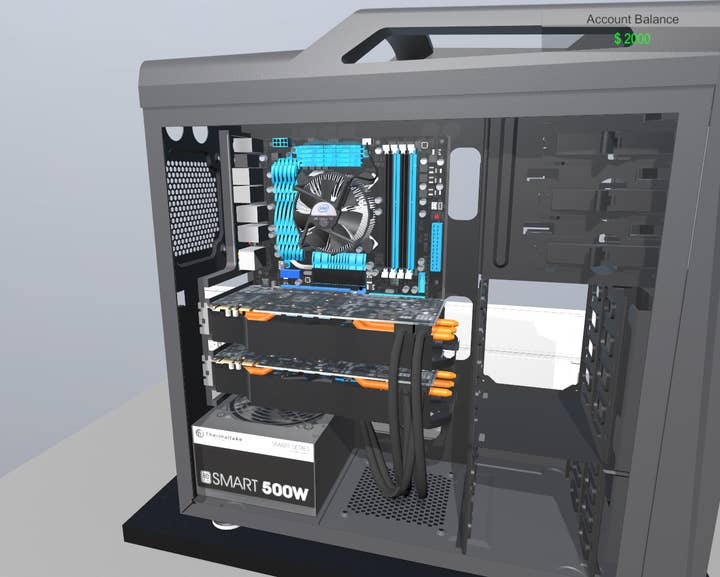“We're not competing with Devolver. We're really not that brave”
New UK publisher The Irregular Corporation explains why it's avoiding the crowded indie space and focusing on the niche
If there's one thing the games industry is not running short on, it's publishers.
As the indie scene has blossomed, long-running resentment against publishers and the control they had over studios in the past has led many developers to take on publishing duties in order to help their fellow creators bring their games to market. Entirely new firms have also emerged, offering indies the publishing support they need without asking them to sacrifice their independence or give up their IP.
So many businesses have appeared in this space over the past few years that it's hard not to feel concerned when we discovered London-based Mediatonic had quietly set up a sister company, The Irregular Corporation, to - guess what? - publish games.
This, we're told, is different. The Irregular Corporation is all too aware of how crowded the sector has become. Stu Morton, who heads up business development at the new venture, quickly rattles off some of the most untouchable firms: Devolver Digital, 505 Games, Team17, Curve Digital. But, he insists, these are no threat to his new firm.

"We definitely don't intend to compete in that space," he tells GamesIndustry.biz. "We know exactly how well served it is. If we were aiming to compete with the established players in this space... it would be a huge risk.
"Our ambition is to be one of the top publishers within the very particular markets we operate in, and that is something we believe we can do with our current focus. We're not aiming to go out and compete with or build a better indie games label than say, Devolver. We're really not that brave, and we love what's already happening in the space."
The key here, he says, is that there's a difference between an indie publisher and an independent one. The Irregular Corporation has no intention of publishing what many would class as indie games, instead focusing on more unusual titles that might not have an obvious channel to the audience they want.
"We want to support interactive entertainment that serves niches that might otherwise struggle to find a common home, or the support to go to market," says Morton. "It might be telling a unique story, tackling the concept of play from a different angle, or serving a group of people who might not necessarily identify as 'gamers'.
"We want our games to be long-term projects - hopefully hobbies to our players and a long commitment for us - that grow over time"
"We want our games to be long-term projects - hopefully hobbies to our players and a long commitment for us - that grow over time. So, we're focusing on launching just a couple of titles a year and investing in growing and nurturing those titles over their lifetime."
The developers his team will work with will also be different from the growing crowd of ambitious and often naïve indies. Instead, they will be looking for studios "building games based around a personal passion", titles that are "a little left-of-centre to the typical games market."
Morton continues: "We expect them to know their audience and their vision, and be passionate superfans of the subject they're building a game about. We're building games for superfans, so details matter - a lot.
"We're currently focused on hobbies, interests, niches that are not served by games at present, and bringing new content and experiences to them."

The first two titles The Irregular Corporation has signed illustrate this perfectly: sailing simulator Sailaway, and the self-explanatory PC Building Simulator (no, really). A third title will be announced this summer, and it's a safe bet it will be in a similar vein.
Sailaway is the prime example of what The Irregular Corporation is trying to accomplish. While it might not strike many publishers as a best-seller, Morton says there is in fact plenty of demand for such a title.
"[Sailing is] one of the biggest sports in the world with tens of millions of fans, yet it is prohibitively expensive for huge swathes of people," he explains. "If you want to learn the basics of sailing a boat, participate in a race, or attempt an Atlantic crossing - for most Sailing fans, these are simply not readily accessible experiences.
"When we saw Sailaway, we could see that what [developer] Richard Knol was creating was so flawlessly and carefully crafted, with such focus on realism, that we truly wanted to help support the title and take it to its audience.
"We don't see niche markets as a risk, but as massively underserved audiences compared to the intense competition in the indie gaming space"
"We anticipate that for a large portion of the players, this may well be one of the first games they've ever played. So, in many cases we don't see niche markets as a risk, but as massively underserved audiences compared to the intense competition in the indie gaming space, which is rich with content."
Even so, it would be easy to assume the crossover between people who are passionate about sailing and those who would want an interactive experience based around it is quite small. To launch a publishing business based on perceived demand for such a title has to be a massive risk.
"Absolutely," says Morton. "Launching any game has an element of risk to it.
He continues: "There have actually been several sailing simulators released over the last ten years - and while some of them are very good, they have had little publishing support.
"There is a passionate and engaged sailing community online who have so far been incredibly receptive and welcoming with the work that Richard has been putting into Sailaway. We've had over 1,000 players - including experienced Sailors - testing and providing feedback on our alpha build."

Perhaps its no surprise that there's both precedent and demand for a sailing simulator; we have, after all, seen players flock to buy something as seemingly odd as Farming Simulator and European Truck Simulator. In fact, the simulator market has touched on a number of much more bizarre areas than sailing, including woodcutting, air traffic control, chemical spillage response, and tunnel mining. Many of these have been viewed with wry amusement by corners of the industry - how can The Irregular Corporation be sure that titles like PC Building Simulator and Sailaway aren't laughed at and dismissed?
"We're focused on creating a realistic experience. If you're sailing a boat in manual mode, you'll actually need to know how to sail that boat"
"We're focused on creating as realistic and authentic an experience as possible in the game," says Morton. "If you're sailing a boat in manual mode, you'll actually need to know how to sail that boat for real in order to properly optimise your voyage.
"The game contains all of the world's oceans, accurately depth mapped, with live weather data to simulate real-world conditions as accurately as possible. Even the stars in the night sky are real and it's possible to use them navigate your boat."
While the initial wave of releases from The Irregular Corporation may be simulator titles, and the company plans to focus on hobbies and other niche markets, Morton says it is still keen to work on a wide variety of titles. Unusually, it's not afraid to point developers in the direction of Devolver, Team17 et al if needed.
"We don't want to confine ourselves to any particular market at this point," says Morton. "We look at everything that comes our way very carefully and will absolutely be open if we think we're not the right people to support the title to its best potential. If it's an exciting indie game that we'd love to play but think will be better served by another publisher, we will say so."
The emergence of companies such as The Irregular Corporation - not to mention the various indie champions it's determined not to compete with - means almost any game can find a route to market, along with the marketing and support it needs to attract an audience. But with discoverability already an issue on most marketplaces (particularly Steam and mobile), does the market really need more publishers?
"This vast supply of new content creates problems for both visibility and distribution that are typically key problems that publishers aim to solve through expertise in marketing, strong relationships with platforms and the network effects of having a portfolio of similar titles," says Morton.
"Overflow of content also creates pressure on prices, and generally creates more polarisation between the big winners which can snowball into huge success, and the games that unfortunately don't do as well.
"In the current climate, it's very difficult to compete as either a developer or a publisher, and we believe it will become increasingly challenging. We believe it will be difficult for the industry to sustain more publishers aimed at the 'indie games' niche in the current climate."
